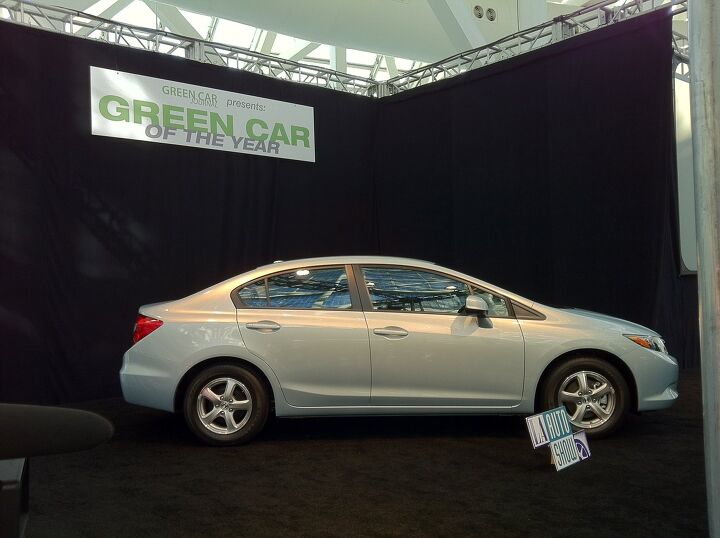Honda Launches Fit EV, But Civic GX Takes Green Car Prize

Between the tsunamis, floods, and poorly-received Civic, Honda has had a rough 2011. But the brand is hoping to put all that behind it by emphasizing its environmentally-friendly product portfolio, announcing a Fit EV which will be made available in California, Oregon and six east coast markets next summer. Unlike Nissan, however, Honda isn’t actually selling the electric commuter cars, but is offering them at a $399/month lease rate. And no wonder: Honda only expects 1,000 of these Fit EVs to find homes over the next three years, probably due at least in part to its north-of-$36k price point. Which may be why the natural gas-powered Civic GX just won the Green Car Of The Year award for Honda. It may not be as radical or purely “green” as a pure EV, but it can sell in volume… in fact, Wards Auto [sub] just reported that Honda is bumping production of the CNG Civic in order to catch up with demand. At a time when Honda is desperate for some good news (and nobody is losing their mind over the new CR-V), a little publicity for one of Honda’s most unique and under-marketed vehicles probably feels like manna from heaven…

More by Alex L. Dykes
Latest Car Reviews
Read moreLatest Product Reviews
Read moreRecent Comments
- Redapple2 Love the wheels
- Redapple2 Good luck to them. They used to make great cars. 510. 240Z, Sentra SE-R. Maxima. Frontier.
- Joe65688619 Under Ghosn they went through the same short-term bottom-line thinking that GM did in the 80s/90s, and they have not recovered say, to their heyday in the 50s and 60s in terms of market share and innovation. Poor design decisions (a CVT in their front-wheel drive "4-Door Sports Car", model overlap in a poorly performing segment (they never needed the Altima AND the Maxima...what they needed was one vehicle with different drivetrain, including hybrid, to compete with the Accord/Camry, and decontenting their vehicles: My 2012 QX56 (I know, not a Nissan, but the same holds for the Armada) had power rear windows in the cargo area that could vent, a glass hatch on the back door that could be opened separate from the whole liftgate (in such a tall vehicle, kinda essential if you have it in a garage and want to load the trunk without having to open the garage door to make room for the lift gate), a nice driver's side folding armrest, and a few other quality-of-life details absent from my 2018 QX80. In a competitive market this attention to detai is can be the differentiator that sell cars. Now they are caught in the middle of the market, competing more with Hyundai and Kia and selling discounted vehicles near the same price points, but losing money on them. They invested also invested a lot in niche platforms. The Leaf was one of the first full EVs, but never really evolved. They misjudged the market - luxury EVs are selling, small budget models not so much. Variable compression engines offering little in terms of real-world power or tech, let a lot of complexity that is leading to higher failure rates. Aside from the Z and GT-R (low volume models), not much forced induction (whether your a fan or not, look at what Honda did with the CR-V and Acura RDX - same chassis, slap a turbo on it, make it nicer inside, and now you can sell it as a semi-premium brand with higher markup). That said, I do believe they retain the technical and engineering capability to do far better. About time management realized they need to make smarter investments and understand their markets better.
- Kwik_Shift_Pro4X Off-road fluff on vehicles that should not be off road needs to die.
- Kwik_Shift_Pro4X Saw this posted on social media; “Just bought a 2023 Tundra with the 14" screen. Let my son borrow it for the afternoon, he connected his phone to listen to his iTunes.The next day my insurance company raised my rates and added my son to my policy. The email said that a private company showed that my son drove the vehicle. He already had his own vehicle that he was insuring.My insurance company demanded he give all his insurance info and some private info for proof. He declined for privacy reasons and my insurance cancelled my policy.These new vehicles with their tech are on condition that we give up our privacy to enter their world. It's not worth it people.”

































































Comments
Join the conversation
I dunno, guys, CNG seems to work for the Australians, and they are much more sparsely populated than the US. I remember as a young boy a certain municipality in the Twin Cities had a city-owned CNG pump in my neighborhood that regular citizens could buy CNG from (by contract, and thus, paid by a monthly assessment and/or bill) for equivalent of $.69/gal. Of course, this was in about 1989, and sort of went by the wayside after the first Gulf War (remember $.89 to $1.09/gal for 93 octane? I DO, thanks Bush 41!). In a world of hydraulic frakking in ND and MT bringing the price of CNG down precipitously (compared to gasoline/diesel), I would'nt be surprised if these starting popping up occasionally from automakers other than Honda.
Australians use LPG (propane/butane) not CNG, which is still very rare and only a handful of buses and fleet vehicles use it. Even with a much cheaper LPG price (55c/L versus $1.40/L for petrol) the local LPG industry is slowly dying. People are apathetic about saving quite a large amount of money when the payback period on installation costs is usually a couple years or more away. Government subsidies for the LPG installation industry are falling away as well. I believe India and Pakistan are the leading CNG vehicle users. When I visited India most of the three wheeler taxis used CNG while the rest were LPG.